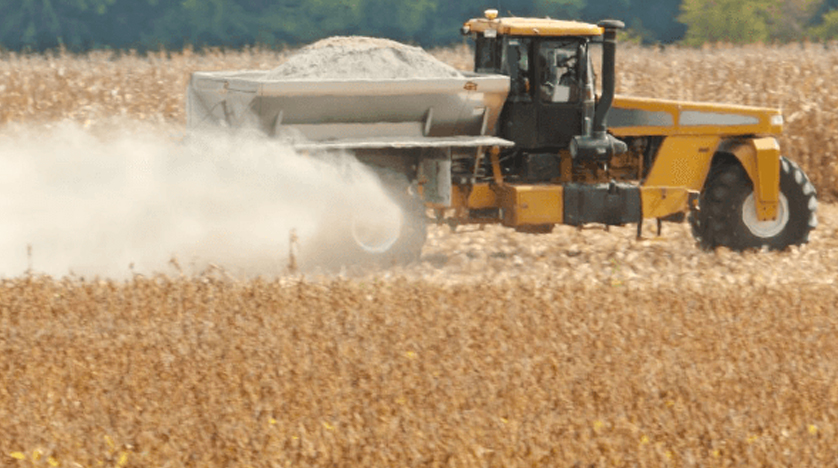
Posted August 8, 2017
Category(s) Industry News Materials

When the acidity levels of soil become too high, vegetation suffers. This can occur for a number of different reasons including acidic rain, the use of certain fertilizers or pesticides, frequent crop cycles, etc.
Fortunately, you don’t need to completely replace the soil in your field, garden or lawn in order to improve growing conditions.
The simplest, most affordable and most effective means of restoring proper pH levels within your soil is by utilizing agricultural lime (or simply, aglime).
If you’ve never applied aglime before, you may have some questions and concerns about how the material works, what it actually is, best practices for its purchase and application and what you should expect to pay.
To walk our customers through the process of choosing and using aglime, we’ve dedicated this post to answering some of the most frequently asked liming questions.
Aglime is essentially just limestone or dolomite that has been ground, washed and screened for use as a soil treatment. The chemical makeup of the aglime makes it possible for essential minerals like calcium and magnesium to be reintroduced into the ground and for pH levels to be restored to neutral. At the same time, the pulverized limestone makes it easier for water to penetrate highly acidic soil and improves a plant’s ability to absorb nutrients such as nitrogen, phosphorous and potassium.
If you’ve decided to use aglime to improve the soil conditions throughout your property, you’ve probably noticed that you have several different options. You’ll need to be aware of the specifications of each to ensure that you select the right material for your needs.
In order to get the most benefit from your aglime, you’ll need to keep a few important items in mind throughout the application process:Volume Required – Different plants thrive in soils with varying pH levels. Calculating how much aglime will be required to reach these specific pH levels can be quite complicated, so it’s advisable that you work with a liming professional to determine how much to apply to your field, lawn, or garden.
Even Application – In order to get the best results, it’s very important that you take the time to carefully spread lime uniformly throughout your coverage area. Be sure that you don’t overlook any corners and that you don’t complete double applications in one or more areas. Slight overlapping is generally acceptable as a practice for ensuring evenness of spread. Avoid applying aglime when winds are more that 10mph as it can scatter the materials and reduce uniformity.
Tillage – Whenever it’s possible, your liming materials should be worked or tilled into this soil. Agricultural lime that’s only applied to the surface of the ground won’t react as quickly. This is because when lime is actually worked into the earth, a larger portion of the aglime’s surface area will be exposed to the soil. Tilling the aglime also minimizes the risk of losing any liming materials to wind or the elements.
Necessary Tools/Equipment – When tilling lime, it’s recommended that the lime be disked in at least twice before being plowed under for maximum distribution. Without the right equipment, you could end up with uneven spread. Those working with liquid lime will also need to make considerations for transporting water to the desired coverage area and spraying.
Most users are anxious to see a positive improvement in the pH of their soil, but it’s important to keep in mind that several factors will come into play as the aglime begins to do its work. The first thing to note is that water is required for lime to react with the soil.
If the earth is dry, you can expect it to take longer to get measurable results. Because of this, it’s smart to apply lime well before your next growing season. If your soil has an extremely low pH level, you will probably be able to see results more quickly, although it will still take time for the soil to be fully neutralized.
The percentage of calcium present in the aglime also makes a difference with regard to how long the liming process will take.
Generally speaking, aglime with a high calcium carbonate equivalent (CCE) will be able to reduce acidity levels more quickly than those with a lower CCE. Finally, finer liming particles are more efficient than course materials.
In addition to measuring pH levels which will reveal the active acidity of the soil, it’s also important to consider the cation exchange capacity (CEC) of the earth. The CEC measures both the active and reserve acidity of the soil. If a soil has a low CEC it will actually have less total acidity that soils with a high CEC, even if the pH is the same.
Even though less agricultural lime is required to correct soil with a low CEC, it may need annual applications to maintain pH levels.
Soil with a high CEC on the other hand might initially need a larger application of liming materials, but won’t likely need a repeat application for several years. The level of production and chemicals introduced to the soil should also be considered when planning for how frequently liming must occur.
Depending on your needs, it may be important for you to understand how aglime works with:
When purchasing agricultural lime, you should understand that the “best” price isn’t necessarily the same thing as the “cheapest” product.
While you want to keep your costs at a minimum, you also don’t want to sacrifice the quality of the materials that you introduce to your soil. Purchasing from an online or street-corner seller could get you the lowest price, but you have no guarantee about where the materials came from or what its CCE is.
You may also be tempted to buy from a major retailer that you feel you can trust, but these chain stores don’t manufacture their own liming materials and will be equally unable to answer important questions about the product. At the same time, their prices will likely be higher, as they must resell the aglime for a profit.
Purchasing your agricultural lime from a direct supplier like Braen Stone is the smartest thing you can do. We own and operate our own quarries, providing us with essential information about the quality and chemical makeup of your liming materials.
We offer competitive wholesale pricing to our customers and can work with you to calculate your liming needs. Our aglime is available for pickup or bulk delivery throughout parts of NJ, NY, NYC and PA.
VIBRATION CONCERNS SUPPORT NUMBER
973-720-7094
Thank you! Your form was submitted successfully.
There has been an error submitting your form.